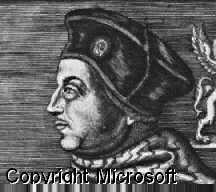
Wolsey, Thomas (1475-1530), English statesman and cardinal, who was among the last great clergymen to dominate political life in England.
 |
Wolsey, Thomas (1475-1530), English statesman and cardinal, who was among the last great clergymen to dominate political life in England. |
Wolsey was born in Ipswich and educated at the University of Oxford. He was ordained a priest in 1498 and was made chaplain to the English king Henry VII. With the accession (1509) of the young Henry VIII to the English throne, Wolsey began to acquire great power and wealth. He received his first major secular appointment in 1511, when he was made a privy councillor. In 1513 he assisted in planning and carrying out the highly successful English invasion of France; in the following year he secured a peace with France. By the time he was made (1515) lord chancellor of England, he already virtually controlled both foreign and domestic affairs for Henry.
Wolsey raised royal authority in England to a new height, but in doing so he incurred many enemies. In the popular mind, Wolsey, as the executor of policy, was responsible for the imposition of heavy taxes to pay for wars. He also was unpopular with Parliament and the nobility because of his power over the king and his ostentatious displays of wealth at a time when there was increasing resentment against the clergy. In affairs abroad Wolsey attempted to make England arbiter of the struggle for power between king Francis I of France and Holy Roman Emperor Charles V. Wolsey played the two rivals against each other, giving England the balance of power in Europe until 1529, when Francis and Charles made peace with each other.
Wolsey also rose rapidly in the church, becoming bishop of Lincoln and archbishop of York in 1514, a cardinal in 1515, and a papal legate in 1518. After being made a legate for life in 1524, he wielded power over the church in England comparable to his secular power as chancellor. He aspired to the papacy and made an alliance with Charles for his support in two papal elections. The emperor did not keep his word, however, and Wolsey never achieved his highest aim.
At the height of his power, Wolsey fell, largely because he failed to secure a prompt annulment of Henry's marriage to Catherine of Aragón, so that the king could marry Anne Boleyn. In 1528 Pope Clement VII appointed Wolsey and the Italian papal legate Lorenzo Campeggio to hear Henry's suit in England. Campeggio was recalled to Rome by the pope in July 1529, and Wolsey was forced to appeal directly to Rome. The pope, dominated by Charles V, who was Queen Catherine's nephew, refused to sanction the divorce.
In 1529 Wolsey's enemies succeeded in having him tried and convicted of violating an old law against holding a foreign court in England. Divested of all his official posts and honours except for the archbishopric of York, to which he retired, Wolsey was subsequently charged with treason and ordered to London. Illness forced him to stop on the way, and he died in Leicester Abbey, on November 29, 1530.
Although arrogant and immoderately ambitious, Wolsey proved himself an able and just administrator and succeeded in his aim of making England a leading power. Also a patron of learning, he founded a college (now Christ Church) at the University of Oxford.
| Home | © Copyright |